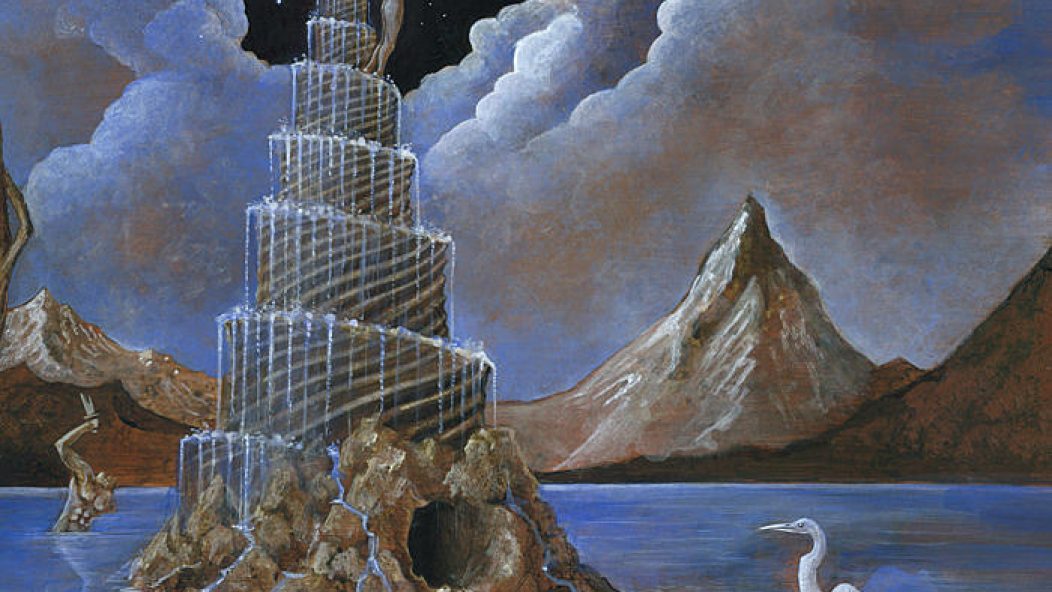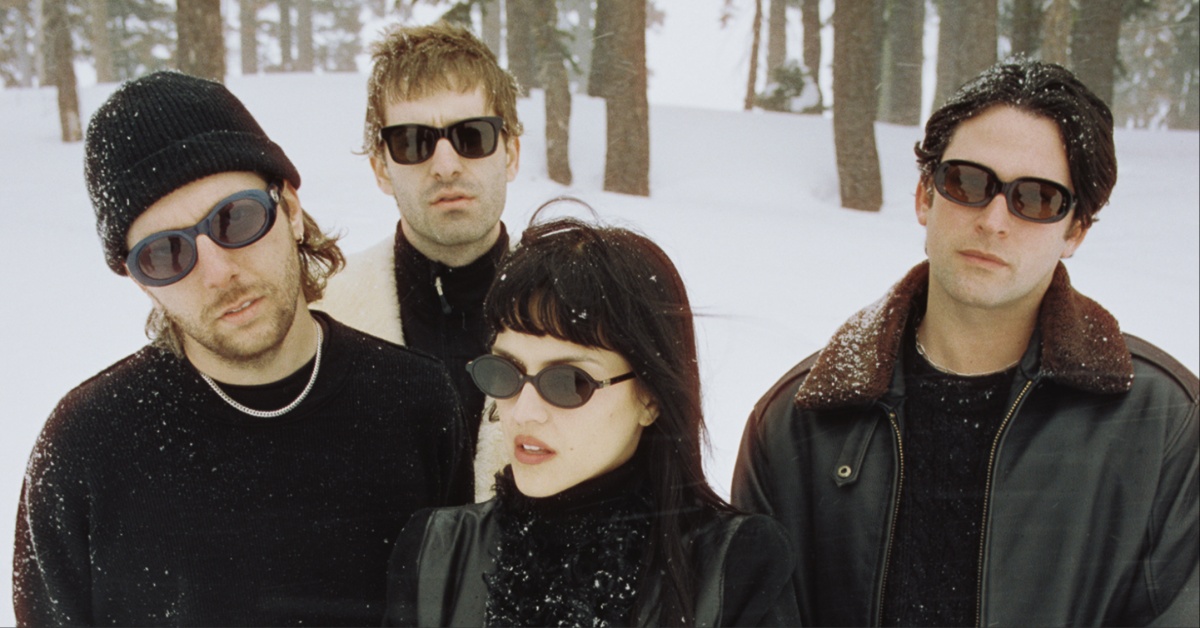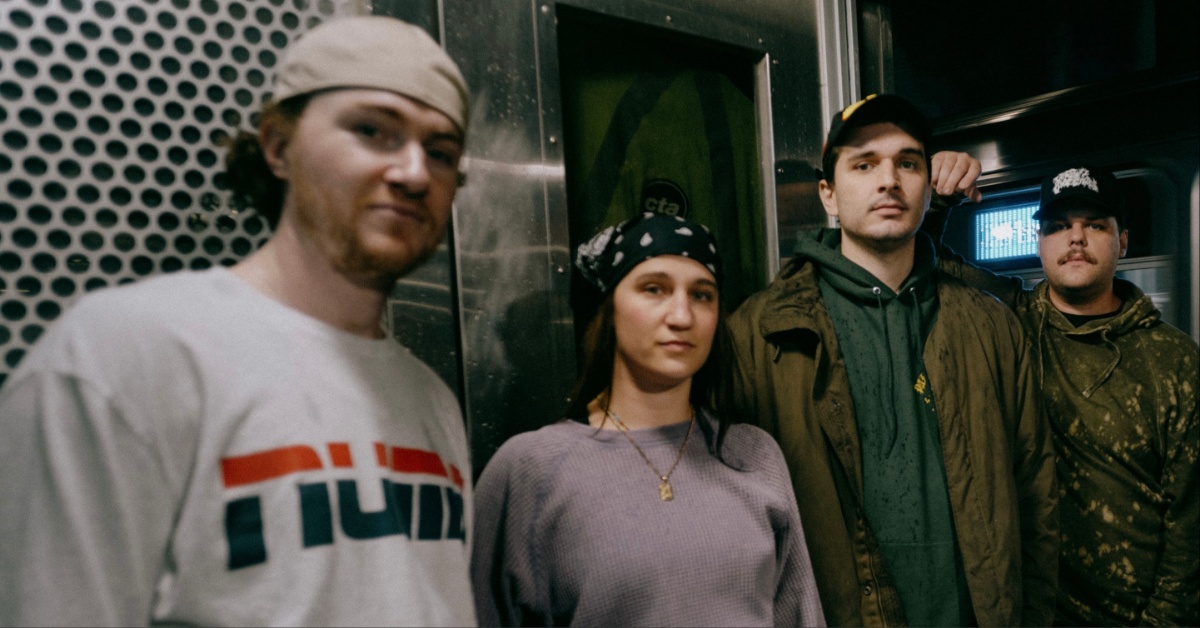
The Cosmic Gnosis of Spectral Lore: Ayloss Reflects on His Black Metal Masterpiece "III"

…
When I want the air to vibrate, I want it to vibrate with Spectral Lore.
…
I don’t know how it happens, but every time I re-listen to Spectral Lore‘s black metal magnum opus III, it hits me just like it did the very first time. I am perpetually taken aback by its sheer scope and magnificent magnitude, not to mention the dynamics and nuances (both musically and emotionally) woven throughout its tapestry. To wit, you could say that III amounts to orgasm for my ears: from its pitch-black moments of silence to its lofty experimental ambiances to its lusciously cosmic blasts, III resolutely sets the bar for an overwhelming gamut. Here is where project mastermind and sole practitioner Ayloss fully exercised his uncanny ability to communicate not in distinct segments or passages but nebulous transitions which themselves comprise powerful micro-movements within a horizonless framework — III‘s seven songs blend like butter, whether cohering within themselves or altogether as one holistic, homeric, hour-and-a-half headtrip.
It’s a goddamn beast.
Songwriting, production, lyrics, and all other things considered, III stands alone in my book: simultaneously so effortlessly dreamy and mesmerizingly savage and existentially upheaving that listening to it demands both poetic licensure and full mental determination. It is unquestionably my favorite black metal album and I make no qualms about that fact. Also, I am unafraid to gush about it every once in a while, because we all deserve a little positive outlet for the things that truly excite us. So what better time than now, the month of its five-year anniversary, to celebrate how (and what) III came to be for those who relish in its veritable garden of black metal delights.
…
…
Important to note from the get-go: this album is exhausting as fuck. Little to do with its behemoth length, actually; much to do with its supernoval levels of intensity. I have to hold my breath for the most triumphant moments; my gut sinks deep and low into the trenches of doom Ayloss juxtapositionally digs into his black metal masterwork. III‘s most extreme moments are consciousness-crushingly dense; at the same time, Ayloss achieves full lucidity when he pirouettes to straight-up face-melter riffs out of nowhere. III also maintains its musical and emotional vividness across its entire runtime — keeping up mentally, as a listener, is nothing short of draining, signifying that III‘s journey is a strenuous albeit innately human one. The album’s narrative “arc” better resembles a tumultuously uneven but unbroken wavelength, reverberating over ever-morphing backgrounds either crystal-clear (e.g. the beautifully eerie acoustic interludes) or consummately abstract (e.g. the saturated layers of blasts and voided howls). Getting lost in III evokes that “transcendent” feeling people who believe in “transcendence” talk about when they “transcend” — the feeling is real, just not the mythos around it, and hell almighty does this album bleed with it.
Also, while plenty of black metal features softer/quieter elements as contrast, rarely do those exude the same level of artistry (or even attention) that the core heavy content does. However, Ayloss’s instrumentation irrespective of distortion or speed or density remains structurally consistent and entirely bespoke, something more defining on III than in any other Spectral Lore release. Songs like “Drifting Through Moss and Ancient Stone” are decisively not black metal if taken alone in their acoustic/ambient nature; in the Spectral Lore context, though, these subtly dramatic moments serve as extreme black metal antithesis, establishing the purposeful and necessary second dimension to define the first. If III was somehow surgically dissected to separate its loud, heavily layered moments from the softer and cleaner ones, the result would comprise two extremely compelling but incompatible albums — again, it’s through irreducible transitioning that Ayloss quite literally blends two opposing poles onto an entirely new spectrum where their terminals converge toward infinity.
The lesson III teaches from a listening perspective is profound: this is an album which asks for the same amount of investment as a feature film, and your attention must likewise be wholly under the medium’s command. This is much more difficult to achieve with music (which is why listening to music while operating a motor vehicle is, uh, markedly different than watching a movie while doing so), but if one black metal album has to take a shot at achieving a film-like experience, I’d vote for III. Plus, given the album’s cosmic and existential themes, it lends itself perfectly to those upheaving closed-eye listens in pitch-back rooms — it’s during these hyper-(de)focused moments with III that Ayloss’s instrumentation, especially guitar, begins to slice through the album’s otherwise impenetrable atmosphere.
As volume, distortion, tension, and intensity ebb and flow throughout each song and across the album, technical complexity follows in an always-appropriate pursuit, enriching the music with the finest of highlights and the subtlest of shadows without overblowing it. III is not an album to chit-chat over; deconstructed, it makes no sense. It is not elite or brash to say that to fully reap III‘s fruits (or those of any other similarly suited album), you must completely release yourself from the past and future, i.e. you must be 100% “present” in the moment. Your mind can wander, but you mustn’t pay attention; you must only hear the music. However you best achieve this is entirely up to you. Suffice it to say: treat III like you would watching 2001: A Space Odyssey, its closet film analogue (in my opinion at least).
…
We are Warriors of the Universe. We are here for a reason.
I believe it wants us to change it. It wants us to evolve ourselves, then our surroundings.
But how? In what direction? Where is right and wrong, in the cosmic scale?
Is it enough to be “good” human beings?
Or is this feat, of such unimaginable difficulty,
That every human must absolutely surpass the limits of one’s existence,
Towards greater and greater understanding, complexity, continuity, fulfillment.
In a great mission to defeat Gravity, to liberate, once and forever,
All Existence from the cycle of birth and death (bang and crunch).
To extend into all dimensions, physical and temporal.
— “A Rider in the Lands of an Infinite Dreamscape”
…
As far as arcs go, penultimate track “A Rider in the Lands of an Infinite Dreamscape” stands triumphantly as III‘s denouement, where Ayloss launches a spectacular array of fireworks all at once. Its blasting opening movement and well-paced cerebral intermission set an almighty soundstage for a climax so climactic it actually contains its own mini-climaxes (the feel almost resembles a Sheperd tone, even, as if III‘s peak couldn’t possibly get any higher only to climb ever higher as cliff-edge anxiety and sheer goddamn awe battle for what remains of the subconscious mind at that point). In fact, this song relishes so gleefully in its own majesty — e.g. the riff which separates the climax from the coda, a face-destroyer if there ever was one — that the song’s underlying dark magic seems to disappear momentarily, relieving body and mind of III‘s immense weight for the most fleeting of moments before album closer “Cosmic Significance” wields its mystifying and entrapping sonic bludgeon like the hammer of fucking death.
I’m not done. Even III‘s production exudes delicate savagery. Equal parts harsh and clear, and mastered such that extra volume seems to boost fidelity, the album sparkles and radiates its negative light in vivid definition. Each instrument occupies private space on the soundstage, allowing your mind to focus-shift from instrument to instrument, even during III‘s most hyperbolically constructed moments. And even when there’s literally no sound at all, Ayloss is still fortifying his music: the silence gaps between a number of the tracks on III are extra-long for dramatic effect, juxtaposing the album’s otherwise seamless nature but somehow not working against it. This makes III feel episodic but bound to narrative, something few albums are able to fully achieve.
Ayloss’s cosmic cries and harrowing howls mesh wonderfully with III‘s songwriting, production, and mood. They’re bleak, they’re almighty, and they imbue the album with an ever-present human torment. While I think III would make an excellent instrumental album, it would lack much of its visceral impact without those dynamic screams. As they curl and twist and intertwine over and under as layers woven throughout III (rather than simply laid atop), they actually help direct your mind’s presence along the album’s undulating wavelength. Guidance, so to speak, both logistically throughout III‘s hyper-complex framework and existentially as they rip your soul in twain.
I’ve spent countless hours with III, whether studiously picking apart its quantum details or just totally melting away into its ice-cold embrace. III was actually instrumental in opening my mind to black metal, destroying my preconceived notions about the genre’s potential effect on my turbulent mental and emotional states. It helped me understand the cruciality of atmosphere not just for black metal, but all music, and its relationship with how music feels rather than sounds. But black metal, as the music of extreme atmosphere, soon became the depths into which I continue to plunge today, an odd blend of catharsis and eternal suffering in a ceaseless void walled only by abstract and esoteric reverberations in the air around me.
To round off my unabashed praise of this album, I had the pleasure of exchanging some more analytical and critical messages with Ayloss regarding III and the future of Spectral Lore. Below, Ayloss reveals interesting nuances about III, as well as exclusive insight into future Spectral Lore material. Enjoy.
…
What did the writing process for III entail both logistically and emotionally? How long did the album take from conception to release, and did you feel relieved or drained (or something else) once it was completed?
I should start with sharing some basic information about the album. The series of albums that are named with Roman [numerals] is generally my “main” series of albums, as in keeping with this kind of atmospheric black metal sound that I had in mind for Spectral Lore in the beginning. They’re also the albums that took me longer to complete and whose completion each spans a number of years. III was the longest at about 6 years, if I remember well, since I had started working on it directly after the completion of II (and Sentinel was a three-month outburst in-between). So, it’s a long period during which lots of things happened in my life. It was a difficult album to complete, both because of practical issues (lack of knowledge in producing music, I mean, you probably have noticed that earlier albums were hardly mixed) and personal ones (it was kind of a dark period during which I wasn’t really going anywhere and wasn’t sure what I wanted to do in life, almost ending up a college dropout — you can’t get dropped out of college in Greece even if you wanted, though! One of the few good things down here).
Relative to the long cycle of completion, [it] was also that I was aware that III contained some of my best musical ideas. I had been keeping these old songs (especially those in the first CD, as those in the second were the most recent ones) and had formed a specific vision about them, one that took a lot of time to materialize, but also one that was progressively evolving. The way I create music is generally very spontaneous; I do have somewhat of a vision for each song, but as I’m working in a computer and composing over large periods, initial plans usually go awry. The songs grew longer and longer as I was working on them… and also new songs were naturally coming up, so eventually the album turned to that 87-minute monster you know. I was incredibly relieved, yes! It was an all-or-nothing sort of moment, like, if people don’t pay attention to my music with this album, they never will. I guess enough did, so can’t complain.
What story does III tell, whether fiction, philosophy, existential, or something about yourself personally?
It doesn’t tell any particular story honestly, every song is its own separate entity. If I had to make a very brief and mundane recap of each song’s central theme, “Omphalos” tells about breaking away from family bonds. “The Veiled Garden” tells about getting lost in the world of dreams. “The Cold March…” is about getting back. “The Spiral Fountain” speaks about man’s destiny, namely immortality. “A Rider…” dabbles with the matter of cosmic meaning and is sort of an amalgamation of all the presented themes. But there is a continuity in how the themes are presented, from transcending the self, to transcending the cosmic. Sort of like: work on your issues first pal, then you get to tackle the big questions. So, I guess it starts from the personal and then it goes beyond. All of the adjectives you used are completely valid and I think are a great overall description of my themes in general. Can’t think of any instance where my lyrics AREN’T all of the above. (Maybe philosophical is a bit of a stretch — I’ve grown enough to understand that my thoughts aren’t that original, so at least inquisitive?).
Did you place any particular songwriting focus on transitions? III features what I call “slow and soft dissolve” transitions from powerfully loud moments to softer, quieter moments and vice-versa — they feel seamless, which gives III its uninterrupted narrative-like feel.
This was something that I had in mind from the very first experiments of Spectral Lore. You see, the project was originally intended to be a post-black metal entity. Well… it still is, but I mean, I intended it to be even more experimental (if you pay attention to the first album for instance, you’ll see that it has the fewest metal moments in any Spectral Lore album). My initial influences came from the weirder parts of black metal (Velvet Cacoon, Leviathan, Xasthur) together with post-rock, modern minimalist/classical music. I think that what you’re describing as “a focus on transitions” is possibly related with my desire to deconstruct the genre and marry it with these disparate influences. In general, one of the things that mostly fascinate me in music is transformations, from one theme to another, from one feeling to another, big changes, the symphony form. I was often listening to classic black metal and was wondering why there weren’t so many attempts towards these directions, so I made some myself.
Is there any background or detail you can share about “A Rider in the Lands of an Infinite Dreamscape?” Many consider this to be III‘s grandest climax — in your mind, does this song stand out in any way among the others?
Ι’ll admit that it does stand out to me too, and when I had written the first two-and-a-half minutes or so, I was aware that I had come up with somewhat “special.” Hm, let’s give away a little secret! Listen to the “Prologue” from the soundtrack of the Playstation game Shadow of Colossus, at exactly 2:24. You’ll hear two chords that I borrowed for the song’s main riff. I loved the soundtrack of the game. By the way, does the song’s title ring any bell now? So there you go, basically “A Rider…” is one huge Shadows of Colossus tribute.
Which artists (metal or non-metal) have influenced you the most? Were there any particular albums, too, which played a huge role in your life during the writing/production period for III?
This is such a difficult question! I remember that the first two Wolves in the Throne Room albums and Blut Aus Nord’s Memoria Vetustaa II were the top albums as reference for what I was trying to do back then.
Which artists have influenced me the most… I’ll have to start with Burzum, even if it makes me a bit uneasy to admit nowadays, as I’ve eventually stopped listening to that asshole’s music for obvious reasons. But it was the beginning of it all. Darkthrone, Bathory, Ulver are obviously huge influences too. Velvet Cacoon, as I took in the beginning the whole drone/ambient black metal idea from them. Again, Wolves in the Throne Room (this fantastic laid-back urgency in their riffs and obviously their political/spiritual outlook) and Blut Aus Nord (the overall compositional genius) were the newer bands that have kept black metal alive for me. Primordial have been a big influence on guitar playing (although another band I abandoned eventually because of the right-wing outlook). Rotting Christ, Varathron, since they’re part of the local musical “air” I breathed. Paysage D’ Hiver and Trist for completing the ambient black metal influence. I’d say these are the basic metal influences that one can pinpoint easily, but since my music goes all over the place, it’s just the beginning. Voyager shows the influence of ambient pioneers like Steve Roach, Robert Rich, and Solar Fields. Fossils owes very much to the drone/folk artist Richard Skelton. The split with Nachtreich to prog/neoclassical groups like Nucleus Torn. Kayo Dot have lately inspired some of the weirder and more experimental parts of my music.
To be honest, I’m looking at my answer above right now and it doesn’t make perfect sense. The question [of] influence is very relative — most of the music I’ve mentioned above I don’t listen much nowadays and wouldn’t necessarily put in my absolute top list, but it seems to be what’s regularly fueling my musical inspiration. On the other hand, there’s a huge lot of other music that hasn’t found its way into Spectral Lore but has clearly influenced me more as a PERSON.
You mentioned Wolves in the Throne Room — have you had the opportunity to see their live performance? If so, I welcome your reactions; if not, then your expectations. Relatedly, I know you’re a one-man operation with Spectral Lore, but have you ever thought about what it’d be like to perform III live somehow?
I have, it was in Athens in 2017. I’ve got to be honest, it wasn’t as amazing as I thought it would be, but then again I knew I should have caught up with the band in their early period, to see what I wanted to see. I have been watching their shows on YouTube since basically their first one and I think their best form was when they were performing in small places like squats, in front of small audiences. I think the raw sound and this kind of aesthetic suits their music better (and it’s also that the Cascadian “movement” had this punk-ish and communal feeling, that’s what made it so special). So yeah, it was good, just somewhat of a standard club show. It doesn’t matter because WITTR are legends anyway.
I won’t say that it doesn’t cross my mind from time to time, but making a Spectral Lore show would be a huge endeavor. I don’t record my music having actual people that would perform it in mind, this creates certain problems, as some parts are practically unplayable (poor drummer, I mean). Perhaps I would be okay with performing it in a raw underground setting, but in a club show, it just makes me anxious to think about it, the amount of preparation and attention to detail that should be given. I don’t think it’s important anyway, what I’m doing is purely studio music. Not that I can tell for sure it won’t ever happen. But if I ever do it, it’ll be basically for fun, I have no interest in making Spectral Lore some kind of professional touring band.
Do you plan to follow III with IV? Is there anything you’d like to share about the possibility of another black metal full-length after the trio of ambient/acoustic EPs and the (awesome) Jute Gyte split?
IV will come eventually, yes! You might have noticed that a similar gap in years from II to III has passed by now, so it’s due time. About half of IV has been already written, I’ve been just slow to produce it, as I’m usually with my Roman [numeral] albums. However, there are other recordings that will come out before it. I’ve got a new split album with Mare Cognitum that has just been completed (basically, it’s the continuation of Sol, we’re going outwards to the planets of the Solar System this time and it’s full-length material in terms of size from both bands!), and yes, another black metal full-length album. And even more stuff! But I’d like to announce them little by little, if you don’t mind.
How much of your musical knowledge is self-taught (including production)? What advice could you give to aspiring artists looking to release something “big” and monumental themselves?
To be honest, I’m not self-taught in music and production, but I also am in some kind of ways. I’ve studied classical guitar seriously and a bit of music production, but concerning composing and the actual stuff I do in production, I’ve discovered it through experimentation. My classical guitar studies were absolutely crucial, because I had developed from a young age a sense of harmony, so I was lucky in this regard. My music production studies not so much, because I had already found my way around, so they were kinda complimentary. So I guess my perspective is that music studies are very good for giving you a general background, but composing is another thing. You need to work it on your own. The only advice I can think is to record stuff all the time and don’t get caught up in perfectionism. Most musicians I know work forever in their first album. Put out stuff, even if it’s just for your friends. Progress is incremental, you’ll have to pass from all stages to go to “big” or monumental. I think the great stuff comes when you’re confident in your failures and feel like you’re not interested to impress anyone anymore.
Regarding black metal in general, how would you guide a new listener into the genre? Imagine a metalhead who listens to death metal, thrash metal, metalcore, etc., but rarely if ever dabbles in black metal. The reason I ask is that III was a “gateway” album for me — I’m wondering if you ever felt it could open the genre up to new ears.
I wasn’t aware of that, I’m very glad that it worked this way for you! I’ve never thought that III could be a gateway album honestly — as a low-budget recording with long tracks, etc. I would think that it takes some experience in the genre to get into it, but that’s wonderful to hear. I’m not sure how I would guide a new listener — I think I’d tell them to go right away for the “important stuff” — it’s how I went with it myself. Maybe an album like Immortal’s At the Heart of Winter would be a smooth introduction. I went directly at De Mysteriis dom Sathanas and A Blaze in the Northern Sky though. To be honest that’s how I’d suggest it to someone else too. Go for the “dangerous” second-wave stuff that carries the primeval power and problematics of black metal as well, because you need to be aware of them from the start. Then I’d suggest the kind of albums that are important for the contemporary wave of black metal that interest me personally and I place myself into, or “black metal” at least (green metal, green black metal, atmospheric ambient space environmental folk black metal?) — oh well…. Wolves in the Throne Room’s Diadem of 12 Stars, Negura Bunget’s Om, Blut Aus Nord’s Memoria Vetustaa II, Skagos’s Anarchic, Falls of Rauros’s Vigilance Perennial. That’s a good start I believe.
In light of your recent cover of Book of Sand’s “No Excuses for Fascist Sympathy,” as well as your recent posts on Spectral Lore’s Facebook page, are we on the edge of a new era for the project? One which may or may not bear overtly political music in the future, but increased public presence and potentially increased output as well?
Ι guess one could say this. I don’t think I’ll make explicitly political music again any time soon, as I prefer a kind of perennial vocabulary that isn’t limited to particular contexts (yet it’s worth remembering that all art is political in any case), but the Book of Sand cover was a manner of publicly breaking ties with the shittiest part of the music scene, once and for all. I didn’t want to leave even the slightest possible interpretation in some idiotic racist’s mind that I might be on their side, just because I’m playing this kind of music. I mean, I’ve seen comments in my videos like “this is 100% white music.” Disregarding the sheer stupidity and racism, it’s discomforting how partaking in a genre with this kind of history can distort your message and I believe we musicians should be much more responsible concerning this. The problem in “metal culture” is that we’ve all taken part at something shitty at some point or another. We’ve all been duped and supported bands that were crypto-nazi, or we’ve done it knowingly because we were fascinated by this stuff, or because separate-art-and-artist. If we don’t own up to our bullshit, the reactionary attitudes will never stop. I’m hopeful though because I’m also seeing increased awareness and also lots of new anti-fascist bands. Let’s kick nazis out of metal.
Regarding increased public presence, it possibly won’t be for very long. But it’s true that I find communication with the fans of my music a refreshing new thing, after almost a decade of basically hiding in silence. The plan is to share some thoughts and stories from every album I’ve made until now and we’ll see from there. I’m hoping for increased output myself, yes. There’s a lot of new stuff that’s coming and the plan is to continue like that.
…
Support Invisible Oranges on Patreon; check out Invisible Oranges merchandise on Awesome Distro.
…











